
Storing nuclear waste:
This deadly stuff, which doesn't exist in nature,
emits tiny particles (smaller than atoms), which travel at almost-light speed.
Since any living thing exposed to long periods or large amounts will die,
robots are being used to transport it.




 AND
AND

